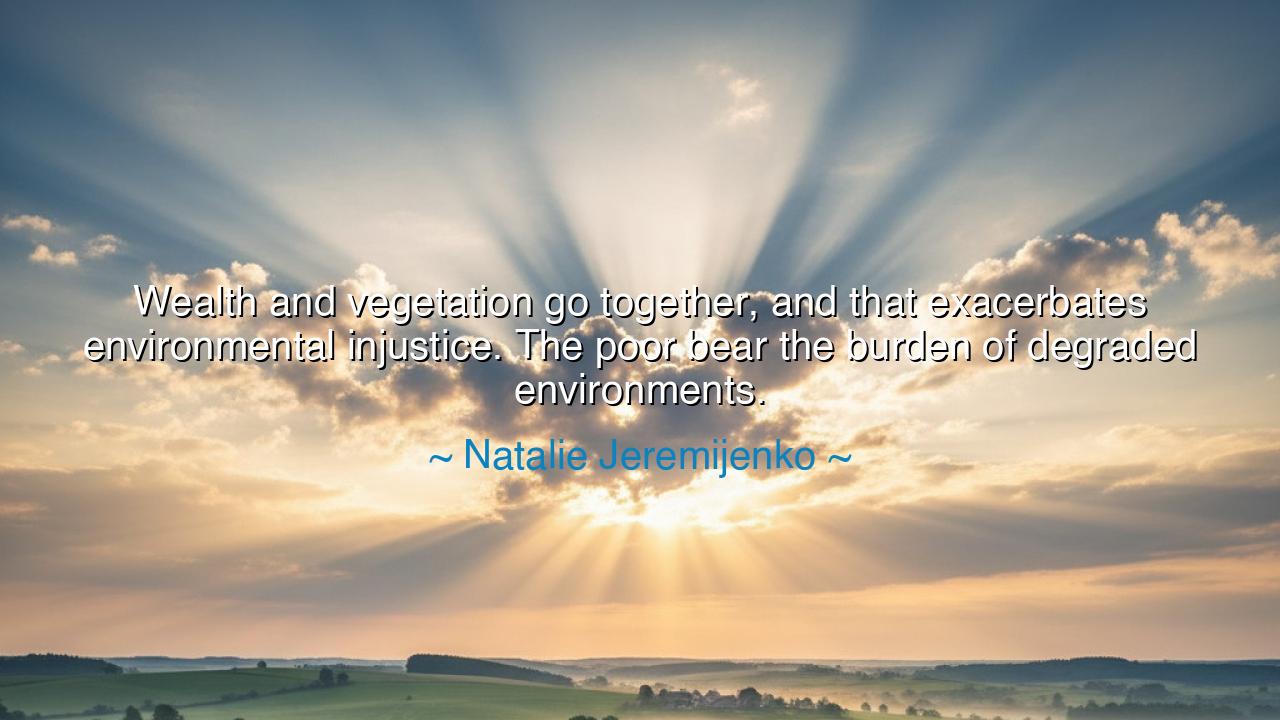
Wealth and vegetation go together, and that exacerbates
Wealth and vegetation go together, and that exacerbates environmental injustice. The poor bear the burden of degraded environments.






Hear now the voice of Natalie Jeremijenko, who speaks not in abstractions but in truths carved into the soil of human life: “Wealth and vegetation go together, and that exacerbates environmental injustice. The poor bear the burden of degraded environments.” This is not a gentle observation, but a cry against the inequality that stains both the earth and its people. For in her words, we see the great paradox of our age: that the greenest gardens bloom where wealth is abundant, while the poor walk among poisoned air, barren ground, and waters fouled by neglect.
The meaning of this teaching is stark. Wealth and vegetation are bound together, not by chance, but by power and privilege. The rich dwell in neighborhoods shaded by trees, cooled by parks, and nourished by clean water and fresh food. Their wealth buys them distance from the factories, highways, and landfills that scar the earth. But the poor, lacking such privilege, are left to breathe the smoke, to drink the contaminated water, to live where the soil is barren and the noise unending. Thus, environmental degradation becomes not merely a matter of nature, but of injustice—a burden unevenly carried, a wound inflicted most deeply upon those least able to heal.
History gives many examples of this cruel divide. Recall the industrial cities of the nineteenth century—Manchester, London, Pittsburgh—where the poor crowded into tenements choked by coal dust and smoke. Their children coughed with blackened lungs, their rivers ran thick with waste, their skies glowed with perpetual soot. Meanwhile, the wealthy fled to suburbs and country estates, where clean breezes and gardens shielded them from the consequences of the industries that enriched them. The prosperity of the few was built upon the suffering of the many, and this is the very environmental injustice Jeremijenko warns against.
Consider also the tragedy of Flint, Michigan, in recent years. When the city’s water supply was poisoned with lead, it was the poor, largely Black community that bore the weight of this catastrophe. Wealthier towns nearby enjoyed safe drinking water, while Flint’s residents endured illness, fear, and betrayal. The crisis revealed with brutal clarity that the poor bear the burden of degraded environments, while the wealthy insulate themselves from such harm. Here, too, the bond between wealth, greenery, and injustice was made plain.
Mark this well, O listener: Jeremijenko reminds us that the distribution of nature is itself political. Parks and trees are not spread evenly. Clean air and fertile soil are not shared equally. They follow the lines of power and privilege. Thus, to fight for the earth is also to fight for justice among people. To heal the land while ignoring the suffering of the poor is to treat only the surface of a wound while leaving the infection festering within.
Let this be the lesson: if you seek to serve the earth, then serve also its people, especially the forgotten and the marginalized. Support policies that bring vegetation into poor neighborhoods—plant trees, create gardens, build parks where there were none. Demand that factories, highways, and waste sites are not forced upon the powerless. And lift your voice for those who have no platform, for their health is tied to the health of the land, and their healing is bound to the healing of the world.
Therefore, O child of tomorrow, take Jeremijenko’s words into your heart. Do not rest content in your own garden’s beauty if your neighbor’s soil is barren. Do not rejoice in clean air if others choke on fumes. True environmentalism is not only the preservation of forests and rivers, but the pursuit of justice—ensuring that all share equally in the blessings of the earth.
Thus her words endure as both warning and commandment: wealth and vegetation go together, but they must not remain bound only to privilege. If the poor are freed from the burden of degraded environments, then the earth itself will flourish more fully. For when justice is sown alongside greenery, both humanity and nature will thrive together in harmony.






AAdministratorAdministrator
Welcome, honored guests. Please leave a comment, we will respond soon